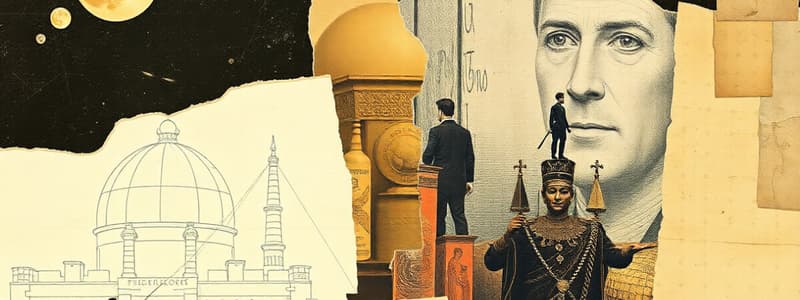Podcast
Questions and Answers
What defines the Prehistoric period?
What defines the Prehistoric period?
- The absence of writing systems (correct)
- The existence of written history
- The development of advanced writing systems
- The establishment of complex political structures
Which of the following civilizations is NOT considered an ancient civilization?
Which of the following civilizations is NOT considered an ancient civilization?
- Egyptian
- Mesopotamian
- Spanish Empire (correct)
- Indus Valley
What major change in human life was brought about by the discovery of fire?
What major change in human life was brought about by the discovery of fire?
- Enhanced protection from predators (correct)
- Creation of written communication
- Development of complex social structures
- Improved methods of agriculture
Which of the following best describes the cultural exchange during Classical Antiquity?
Which of the following best describes the cultural exchange during Classical Antiquity?
What was a notable effect of the Black Death during the Medieval Period?
What was a notable effect of the Black Death during the Medieval Period?
What characterizes the Early Modern Period?
What characterizes the Early Modern Period?
What was one notable outcome of the Protestant Reformation?
What was one notable outcome of the Protestant Reformation?
Which advancement is attributed to ancient civilizations?
Which advancement is attributed to ancient civilizations?
Flashcards
Prehistory
Prehistory
The time before writing was invented. Humans used stone tools and adapted to different environments. Fire was a big discovery!
Agricultural Revolution
Agricultural Revolution
A period of great change marked by the development of farming, which allowed humans to settle in one place. This led to the formation of villages and later, cities.
Ancient Civilizations
Ancient Civilizations
Ancient civilizations developed complex social systems, laws, writing, math, and art. They built magnificent structures and had powerful leaders.
Classical Antiquity
Classical Antiquity
Signup and view all the flashcards
Medieval Period
Medieval Period
Signup and view all the flashcards
Early Modern Period
Early Modern Period
Signup and view all the flashcards
Modern History
Modern History
Signup and view all the flashcards
History
History
Signup and view all the flashcards
Study Notes
Historical Periods
- History encompasses the entirety of past events, from the earliest civilizations to the present day.
- It's a vast and complex field of study, involving numerous disciplines and perspectives.
- The study of history involves analyzing primary and secondary sources to reconstruct past events.
- Methods for studying history include analyzing written documents, archaeological evidence, oral traditions, and material culture.
- Historical interpretations can vary based on different perspectives and methodologies.
Prehistory
- Prehistory refers to the period before the development of writing systems.
- This era is often divided into different stages based on technological and cultural advancements.
- Early humans developed stone tools and adapted to various environments.
- The discovery of fire significantly impacted human life.
- Agricultural innovations marked a crucial turning point in human history, leading to settled communities.
Ancient Civilizations
- Ancient civilizations developed complex social structures, political systems, and economic activities.
- Examples include the Mesopotamian, Egyptian, Indus Valley, and other civilizations.
- Ancient civilizations made significant advancements in mathematics, astronomy, architecture, and writing.
- Societies developed forms of governance, religious systems, and artistic expression.
Classical Antiquity
- This period encompasses ancient Greece and Rome.
- Ancient Greeks developed philosophy, democracy, and theatre.
- The Roman Empire was a major force in the ancient world, encompassing vast territories and influencing law, engineering, and governance.
- Cultural exchange between the Greeks and Romans significantly shaped Western civilization.
Medieval Period
- The Middle Ages, or Medieval Period, spanned several centuries and witnessed significant transformations.
- This period saw the rise of feudalism, the growth of Christianity, and the Crusades.
- Major events and developments influenced art, architecture, and society.
- The Black Death had a catastrophic impact on the population of Europe.
Early Modern Period
- The Early Modern Period saw the rise of nation-states, exploration, and the Renaissance.
- Exploration and colonization profoundly impacted global interactions.
- The Scientific Revolution challenged traditional understandings of the world.
- The Protestant Reformation led to religious conflicts and shifts in power dynamics.
Modern Period
- The Modern Period encompasses the 18th, 19th, and 20th centuries.
- Major historical events, such as the French Revolution, industrialization, and World Wars, shaped contemporary societies.
- This era witnessed significant developments in science, technology, and global interactions.
- The 20th century saw the rise of nationalism, decolonization, and the Cold War.
Contemporary History
- Contemporary history refers to events that have taken place in recent decades.
- Global interconnectedness, technological advancements, and international conflicts are key features of contemporary history.
- The development of the internet and globalization have dramatically impacted societies worldwide.
- International relations and conflicts continue to shape the world.
Studying That Suits You
Use AI to generate personalized quizzes and flashcards to suit your learning preferences.




